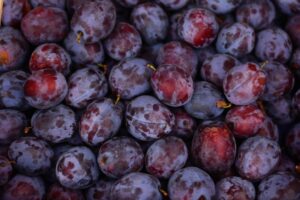My dad would have turned 96 this week. After his birth in Washington, DC, he and his family lived in various locations including New York as well as the Shenandoah Valley. Many people knew dad through his work as a taxidermist along the Valley Pike but we, his children, were fortunate enough to know him as “dad.”
Beyond taxidermy, however, Dad had many other gifts and interests. Aside from being an excellent Sunday School teacher, he was an avid reader and skilled painter, and he also enjoyed gardening and related interests. In particular, I recall the small orchard he kept at the rear of his shop and a few Concord grapevines he grew for mom’s jelly and jam production. The fruit trees consisted mainly of red and golden delicious apples, a few peaches, some pears, and a plum.
It was this plum tree that gave dad the most anxiety. No matter what he tried, he could not seem to get that ornery tree to bear plums. The tree grew taller and healthier and Dad was certain that one year it would yield him a crop. He faithfully sprayed and pruned it and anxiously awaited its firstfruits. Each spring it would be covered with thousands of beautiful blossoms, the bees would buzz, and the hopes would grow. But alas, each autumn there was only leaves without even a single plum.
Somewhere along the way, dad started mentioned the chain saw. His patience was wearing thin and he was tired of endless work for no rewards. The nutrients and water that it consumed and the ground that it occupied could be better used for some more productive venture. This tree was wasting its space and its opportunities on its selfish pursuits of growth and enlargement.
Before he had an opportunity to carry through on his threat, however, low and behold, the heretofore fruitless plum tree bore its first crop! Not just one or two, but hundreds of plump purple plums covered the tree and ripened up for the picking! We were all amazed at this unexpected turn of events and were thankful the chainsaw had not been started as dad finally began to enjoy the fruits of his labors.
This tree, however, was skating on thin ice. With nothing to show year and after year, it’s lucky it didn’t get the axe several seasons earlier. We all joked that it must have heard dad’s threats and decided it was finally time to get busy.
This plum tree became one of Dad’s favorite teaching illustrations reminding others to bear fruit for our Owner. In Luke 13, Jesus told of a man who planted a fig tree in his vineyard. For three years it too was fruitless. The caretaker promised to encourage it with fertilizer and best management practices for another year and if it was still unproductive, the owner declared he would cut it down. “Why should it use up the soil?” he asked.
We’re never told if that tree dodged the axe or not, but Jesus’ point wasn’t about figs or plums. It was primarily about how Israel and her leaders were wasting the message and the kingdom God entrusted to them and failing to produce the fruit of righteousness He desired. Unfortunately, their failure to do so led to their felling at the hands of the Roman axe in 70AD.
Today, as we consider Jesus’ parable, we realize that as His church collectively and as His followers individually, we ought to be producing the fruit of the Spirit. Each believer should exhibit the characteristics for which He’s saved and gifted us.
In Galatians, Paul describes that fruit as being love, joy, peace, patience, kindness, goodness, faithfulness, gentleness and self-control. Each believer should not only promise these in our blossoming talk, but should hang full of these qualities each and every day. Although Jesus has promised not to cast away any who come to Him, His warning here about the unfruitful being cut down certainly should motivate us to be prolific trees in His orchard.
As another summer nears its end with juicy ripe plums, may they remind us to be productive Christians demonstrating and producing the type of fruit that pleases our orchard Owner and that is attractive, beneficial, and delightful to others as well. May we not be guilty of just using up God’s gifts and goodness for our own benefit. Blessings, George